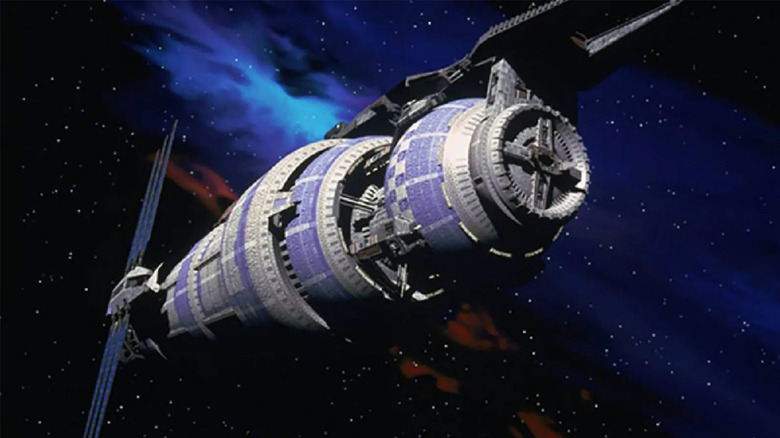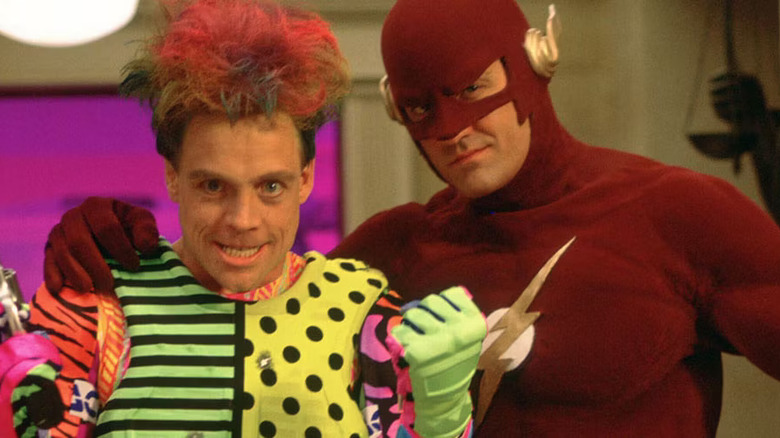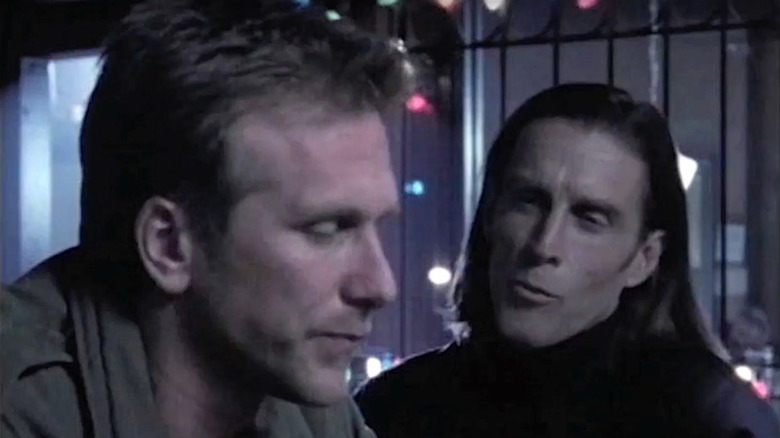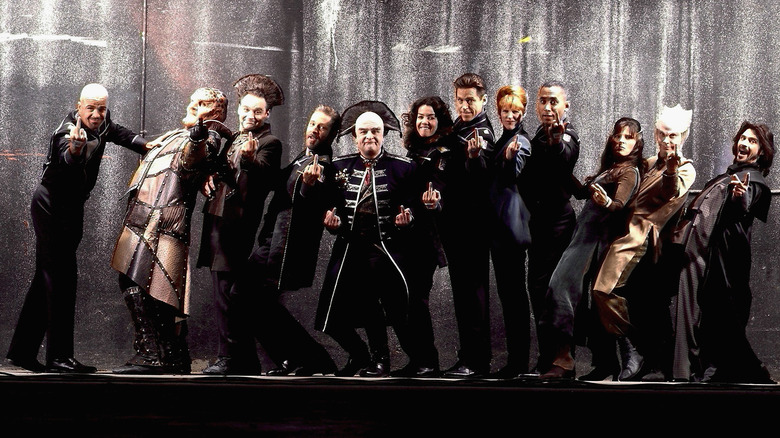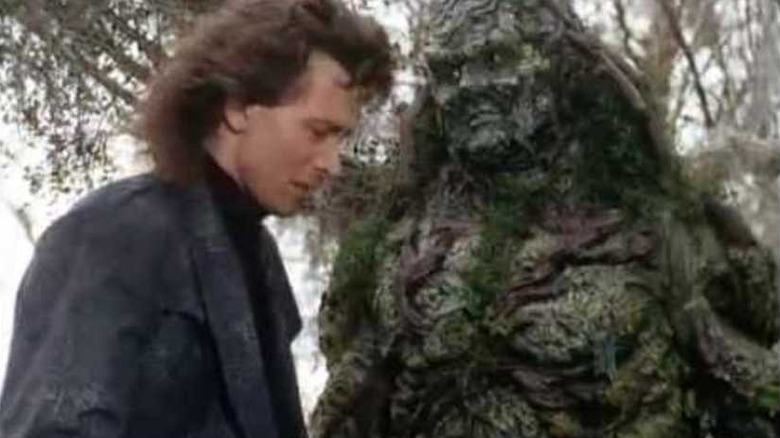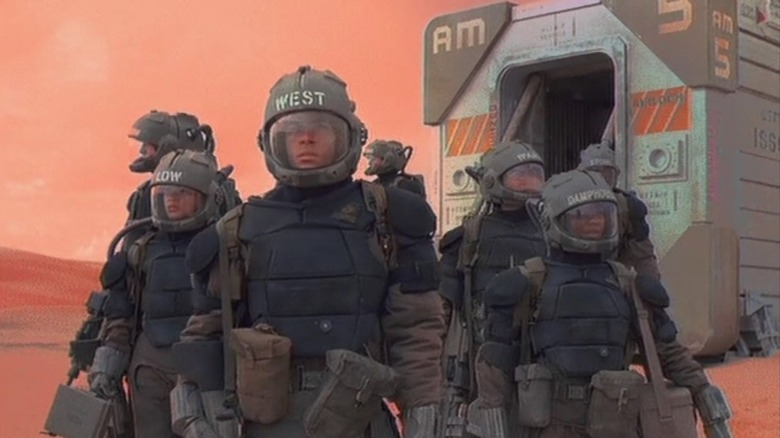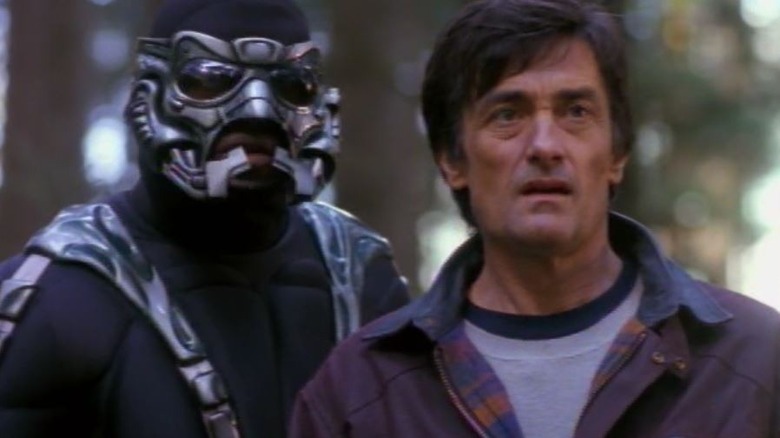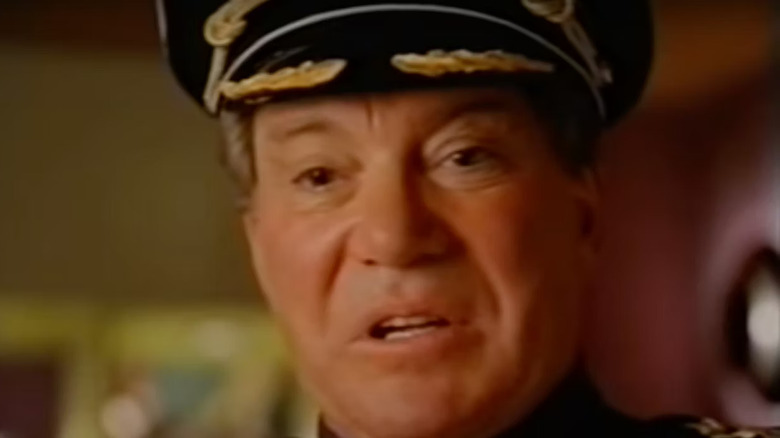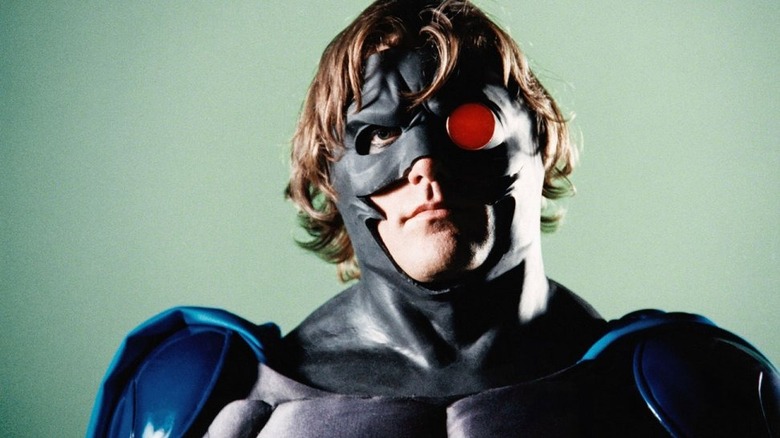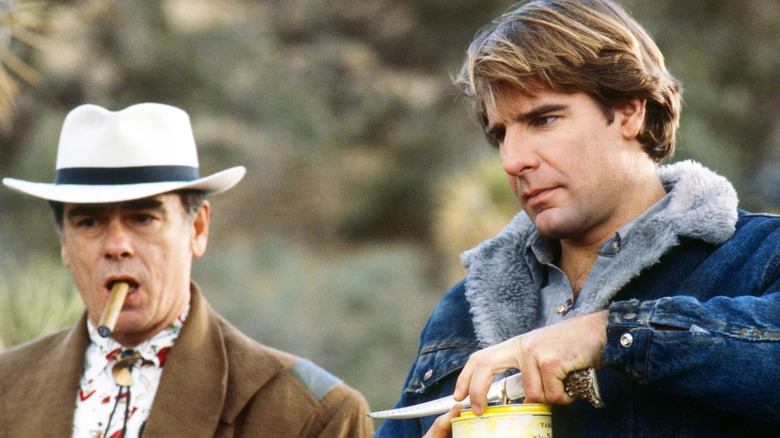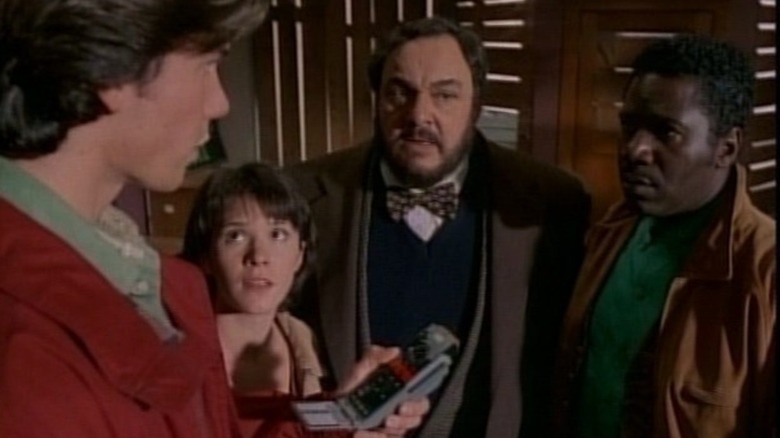90s Sci-Fi TV Shows With Awful Reviews That Are Actually Worth Watching
We live in a golden era of sci-fi on TV, where "Star Trek" and "Star Wars" come in multiple flavors, "Stranger Things" is an event every season, and the CW recently wrapped up an entire universe of DC Comics superheroes on the small screen. Fortunately for all sci-fi fans, this is a time where the people who make such shows grew up loving them, and critics who review them were raised on the concepts and get it. This is all a relatively new phenomenon.
As recently as the '90s, TV critics weren't necessarily big on high-concept sci-fi, and the people making these shows didn't always know what they were doing either. Even if they did, producers over their heads weren't necessarily making the best decisions either. Superheroes on TV were entirely different three decades ago, and the weekly format was just discovering the notion of season-long arcs. There were growing pains to be sure, but all sci-fi shows could often get tarred with the same brush. So when it comes to shows from the '90s with awful reviews that you need to see, some are plain great, some are interesting failures, and others are arguably bad but in ways that make them worthy of your attention nonetheless.
So crank up your official CD soundtracks that nearly always include Dave Grohl and Rob Zombie, pop open a Surge, and let's look at some sci-fi shows from the '90s with awful reviews that you should still seek out.
The Flash
"The Flash" — not the popular, long-running CW version, but the 1990 CBS iteration — was clearly inspired by Tim Burton's "Batman," with its Dave Stevens-designed muscle suit, Danny Elfman score, and fantastical Central City. In casting square-jawed soap opera veteran John Wesley Shipp, the showrunners even hoped to avoid a casting controversy similar to the one surrounding Michael Keaton's against-type Bruce Wayne. With a brighter palette, the show also took a cue out of Warren Beatty's "Dick Tracy," which used primary colors to create a cartoonish aura.
The influences were not lost on Howard Rosenberg at the "L.A. Times," who noted "'The Flash' has neither the humor of 'Dick Tracy' nor, even though much of its action occurs at night, the brooding darkness of 'Batman.'" In conclusion, he added, "flush 'The Flash.'"
Except you shouldn't. Time has been kind to the show that cost over a million dollars per episode in 1990, with Shipp's version of Flash joining the 2014 CW show to play original Flash Jay Garrick. The original was also ground zero for Mark Hamill's career as a super-villain, as he played the Trickster in live-action before he turned a quick cameo into a career as the Joker. Other recurring actors and guests included Richard Belzer, M. Emmet Walsh, Dick Miller, Jeffrey Combs, David Cassidy, Jeri Ryan, and many more. Alas, the high costs and a timeslot opposite "The Simpsons" and "The Cosby Show" proved more deadly than any supervillain.
Brimstone
One of the better supernatural/sci-fi shows that popped up in the wake of "The X-Files" was Fox's "Brimstone," which cast "thirtysomething" star Peter Horton as Ezekiel Stone, a cop sent to Hell for employing vigilante justice against his wife's killer. There, a campy Satan (John Glover) puts him up to the task of chasing down fugitive souls who've escaped from Hell, all of whom have varying degrees of super powers depending on how much time they've spent in damnation. Only shooting them through the eyes will send them back where they belong.
It sounds like fun now, but critics didn't think so then. Caryn James at the New York Times called it "icky and boring," while John Carman at the San Francisco Chronicle summed up most of the criticism by opining that the show was, "dark, and earnest, and a bit too smitten with its own ornate premise." A show where John Glover plays the Devil and an angel, "Meet the Parents" star Teri Polo is an ancient Canaanite priestess who led a rebellion in the underworld, and Lori Petty's the front desk clerk at the motel where Stone stays? All with preposterous supernatural rules like every dead soul's personal items regenerating in their pockets every day? This was too "dark and earnest" in the '90s?
In a post-Zack Snyder DC Extended Universe world, "Brimstone" deserves a re-appraisal. Much like "The X-Files," it may have just been too deadpan for its time, and with two male leads, crucially lacked an Agent Scully type for female fans to connect with.
Babylon 5
"Babylon 5" was a pretty radical swing for a sci-fi show. J. Michael Straczynski's epic saga of a multicultural space station came to TV with a five year-arc already planned, and a cast of characters and themes that would sound most at home on a "Star Trek" series. Indeed, "Deep Space Nine," which aired around the same time, was quite similar, though never in any provably actionable way, as it was actually inspired by a '50s Western series.
In hindsight, "Babylon 5" is a bold epic, one that improved significantly once season 1 lead actor Michael O'Hare was replaced with the more TV-seasoned, William Shatner-esque Bruce Boxleitner. At the time, critics like Scott Williams at the Boston Globe said, "Great special effects do not make for great science fiction. Writing is what makes TV series cook."
Talk about a quote that hasn't aged well — writers for the series included Peter David, Neil Gaiman, Kathryn M. Drennan, Larry DiTillio, D. C. Fontana, and David Gerrold. As for those early CG special effects, few shows have looked so instantly dated, especially compared to the miniatures of "Deep Space Nine." Watching "Babylon 5" today, in fact, the biggest trick is to focus on the solid storytelling, and ignore the fact that the spaceships look like PS2 graphics with no weight.
Walter Koenig, who regularly appeared on the show as a judgmental psychic, vastly preferred it to "Star Trek." And there's even a "Babylon 5" reboot coming.
Swamp Thing
It seems strange to think now, but in the late '80s, Swamp Thing might have been the most popular DC Comics character after Batman, primarily due to Alan Moore's drastic re-invention of the character adding a touch of David Cronenberg-ian body horror and a heavy dose of pagan mythology. (Here's what you need to know about that.) Media tie-ins understood the character was appealing, but not quite why, so 1989's "The Return of Swamp Thing," a loose sequel to Wes Craven's 1982 adaptation of the earlier comics, went in a campy, comedic direction. By the following year. "Psycho" co-scripter Joseph Stefano realized this mistake and developed a more serious TV version for USA Network, though it once again starred stuntman Dick Durock, from both live-action films, in the title role.
The show never quite went full Alan Moore — like the movies and the subsequent cartoon and toy line, it remained stuck in the paradigm of Swamp Thing as mutated scientist Dr. Alec Holland, against his Dr. Frankenstein-like arch-nemesis Dr. Arcane and his mutant Un-Men. Nonetheless, it went with the sort of low-key eerie vibe common to similar BBC sci-fi shows and creepy anthologies like "The Outer Limits." The effects may not always have been the best, but the vibe stayed unsettling. Swamp Thing's costume also got progressively better and better.
It's hard to find reviews of the series from when it was released, but even retrospective reviews which ought to have more perspective are unkind. It's not Alan Moore's "Swamp Thing," but it was never meant to be.
Space: Above and Beyond
The poor performance of Paul Verhoeven's 1997 "Starship Troopers" is often blamed on the fact that neither critics nor audiences truly grasped that it was a satire, and thought it failed as a straight-up space war movie. Yet just two years earlier, a more serious take on the concept came to TV, and died a quick death. "Space: Above and Beyond," created by "X-Files" writing team Glen Morgan and James Wong, depicted a space war against a mostly faceless enemy, with weekly episodes following space-based Marines in battle. Toward the end of the first season, there were hints of a story twist that might have cast the war in a different light, as Verhoeven's film did, but the show didn't last long enough for anyone to find out.
Still, the tone was arguably more anti-war than audiences wanted in a humans versus aliens battle show. Inspired by books like "The Red Badge of Courage" and "The Forever War," it was already leaning towards being the opposite of Robert Heinlein's original "Starship Troopers" novel. Add to that a literally dark color palette that accentuated the bleakness, and it might have seemed just too much of a downer. Ken Tucker of Entertainment Weekly called it "unlikely to spawn the rabid cult following that the Fox network hopes for" due to being "as slow and obvious as 'The X-Files' is fast and subtle." Perhaps if it had time to develop its twists, he would have reassessed.
M.A.N.T.I.S.
Wouldn't you want to watch a TV series created by Sam Raimi and "Batman" screenwriter Sam Hamm, featuring the first Black superhero on prime-time TV? That's barely a rhetorical question now, but it certainly was in 1994. Sadly, the answer from most audiences seemed to be "no."
Carl Lumbly, whom modern superhero fans know best as the voice of J'onn J'onnz in the Dc Animated Universe, and original super-soldier Isaiah Bradley in the Marvel Cinematic Universe, starred as paralyzed scientist Dr. Miles Hawkins. With the aid of Iron Man-ish armor — the "Mechanically Augmented Neuro Transmitter Interception (or "Interactive") System," or M.A.N.T.I.S. – he became a super-powered vigilante, who also happened to look mildly insect-like. Like a mantis! Get it?
Due to poor reception, the show retooled several times, first by recasting most of the roles from the pilot and later by leaning into more fantasy-based storylines. Howard Rosenberg's L.A. Times reaction to the pilot was typical, calling it, "the kind of movie that can give an insect a bad name...introducing a comic (unintentionally, it appears) super-hero who wears a mantis-like gizmo on his head." Just imagine anyone today thinking that the camp factor in a Sam Raimi production could possibly be unintentional.
To wit: the finale has Miles die battling an invisible dinosaur.
Perversions of Science
"Tales From the Crypt" was such a massive hit for HBO from 1989 through 1996 that it only made sense to look for more EC Comics to adopt. The science fiction equivalent comics made the most sense, but their name, "Weird Science," was already associated with a 1980s sci-fi sex comedy, and its TV spin-off. Perhaps also inspired by the success of their nudity-heavy sitcom "Dream On," HBO made it "Perversions of Science" instead, with a pointedly erotic opening sequence and sexy CG robo-host named Chrome as the Crypt Keeper equivalent.
In the third episode, Kevin Pollak gets a key part of his anatomy stuck inside a sexbot and must hide it from his fiance (Melanie Shatner). Those EC Comics do predate the Comics Code, but we're pretty sure that never happened in the 1950s tales. This kind of forced "maturity" and Chrome's sex puns, rather than the straightforward sci-fi with a twist of the original comics, didn't help the show find viewers.
Yet what a guest roster! William Shatner, Wil Wheaton, Jason Lee, Jamie Kennedy, Jeffrey Combs, Ron Perlman, Elizabeth Berkley, Vincent Schiavelli, Adam Arkin, Chris Sarandon, and even Dr. Joyce Brothers made appearances across the 10 episodes, which featured such directors as Walter Hill, Russell Mulcahy, Sean Astin, Tobe Hooper, and yes, William Shatner. (We probably don't have to tell you his was the Kevin Pollak sex-bot one.) The concept may have been a trainwreck, but in this case it's definitely one worth staring at.
NightMan
With Marvel and DC trying to get movie deals up and running throughout the '90s after the success of "Batman," TV networks either tried to come up with their own (like M.A.N.T.I.S.) or look elsewhere. Enter the Ultraverse. Created by Malibu Comics, the Ultraverse in comics was anchored by Prime, a superhero with muscles on top of muscles — to a point that Rob Liefeld would probably consider excessive — who was actually a 13 year-old boy, not unlike Shazam. Visually, Prime would have looked ridiculous with '90s TV effects, like Abobo in the "Double Dragon" movie, so uber-producer Glen A. Larson went with NightMan instead. It surely didn't hurt that night and shadows go a long way towards hiding the seams in latex costumes.
NightMan was Johnny Domino (Matt McColm), a saxophonist whose cable car got struck by lightning in a freak accident, as can happen. Now burdened with insomnia and the ability to hear evil thoughts, he crafted a super suit that also gives him laser-vision, invisibility, and the power of flight. A bit like rival producer Stephen J. Cannell's "The Greatest American Hero," that was only if his suit worked properly.
Among those making special appearances on the show were Taylor Dayne, David Hasselhoff, Donald Trump, Jerry Springer, Little Richard, and perhaps most notably, Simon MacCorkindale as the character "Manimal," from the previous Larson superhero show of the same name.
NightMan would be the prolific Larson's last new TV series, though updates of "Battlestar Galactica" and "Knight Rider" continued to bear his name.
Quantum Leap
"Quantum Leap" seems beyond reproach now; so much so that there's a sequel series that ran for two seasons but recently ended up canceled. But that wasn't always the case. The L.A. Times review of the pilot called it "so excruciatingly slow and laborious that you wonder if director David Hemmings was trapped in his own time warp...It is amazing that a show about time, however, would have no concept of it." A mixed New York Times review gave the show credit for unpredictability and the performances of stars Scott Bakula and Dean Stockwell, while also noting the show seems "shamelessly influenced by every back-to-the-past scenario from the old movie 'Here Comes Mr. Jordan' to the television series 'Highway to Heaven.”'
Granted, Bakula's Sam Beckett was a bit of a goody two-shoes, which made his more evenhanded Jonathan Archer in "Star Trek Enterprise" a refreshing change of pace. But his moral compass was counterbalanced by Dean Stockwell's Al, the holographic projection of his friend from the future, who could provide him with invaluable intel on what his time-traveling, body-hopping mission was in any given week.
No good deed goes unpunished: in the finale, Sam meets a seemingly omnipotent bartender who persuades him to keep leaping through time helping people, never getting to go home himself. In a final leap, he fixes Al's life, and then vanishes; never, we're told, to return to his own time. The sequel series suggests something more, but it seems for now that Bakula won't make a cameo.
Sliders
Before the MCU and the Multiverse, "Sliders" visited new parallel Earths and variants every week. Jerry O'Connell starred as the Quinn Mallory, the tech genius who invented the dimensional hopping, with John Rhys-Davies as his mentor, Professor Arturo. Along for the ride were Quinn's friend and eventual love interest Wade (Sabrina Lloyd), and singer Rembrandt Brown (Cleavant Derricks). Beginning on Fox and ending on Syfy (then Sci-Fi), the show underwent numerous creative overhauls, cast changes, behind-the-scenes feuding, and eventually began to feel like a ripoff-of-the-week show. By the end, only Derricks remained from the original principal cast.
Still, before it started alienating viewers and its own leads, "Sliders" offered up several creative alternate histories. In one Robin Hood riff, Rhys-Davies' variant was the Sheriff of Nottingham as Rush Limbaugh-style commentator, made doubly amusing by the fact that the actor's politics are conservative in real life. Both he and O'Connell have had healthy careers in the genre space since, with the former eternally tied to Sallah and Gimli, and the latter a regular voice on "Star Trek: Lower Decks." Nobody's saying watch the later episodes without those two, but before they left, it was once a show worth checking out.
If you're looking for more poorly reviewed sci-fi worth watching, we've got a list of movies that might interest you too.
